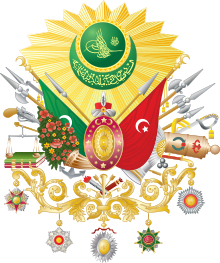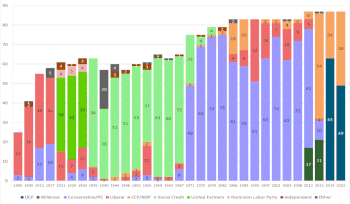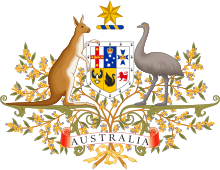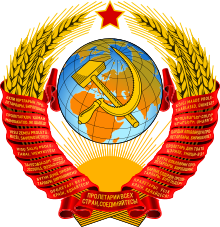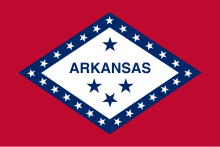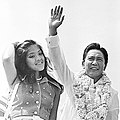Portal:Politics
| Main | Topics and categories | Tasks and projects |
The Politics portal
Politics (from Ancient Greek πολιτικά (politiká) 'affairs of the cities') is the set of activities that are associated with making decisions in groups, or other forms of power relations among individuals, such as the distribution of status or resources. The branch of social science that studies politics and government is referred to as political science.
Politics may be used positively in the context of a "political solution" which is compromising and non-violent, or descriptively as "the art or science of government", but the word often also carries a negative connotation. The concept has been defined in various ways, and different approaches have fundamentally differing views on whether it should be used extensively or in a limited way, empirically or normatively, and on whether conflict or co-operation is more essential to it.
A variety of methods are deployed in politics, which include promoting one's own political views among people, negotiation with other political subjects, making laws, and exercising internal and external force, including warfare against adversaries. Politics is exercised on a wide range of social levels, from clans and tribes of traditional societies, through modern local governments, companies and institutions up to sovereign states, to the international level.
In modern nation states, people often form political parties to represent their ideas. Members of a party often agree to take the same position on many issues and agree to support the same changes to law and the same leaders. An election is usually a competition between different parties.
A political system is a framework which defines acceptable political methods within a society. The history of political thought can be traced back to early antiquity, with seminal works such as Plato's Republic, Aristotle's Politics, Confucius's political manuscripts and Chanakya's Arthashastra. (Full article...)
Selected article
The unification of Germany into a politically and administratively integrated nation state officially occurred on 18 January 1871 at the Versailles Palace's Hall of Mirrors in France. Princes of the German states gathered there to proclaim Wilhelm of Prussia as Emperor Wilhelm of the German Empire after the French capitulation in the Franco-Prussian War. Unofficially, the transition of most of the German-speaking populations into a federated organization of states occurred over nearly a century of experimentation. Unification exposed several glaring religious, linguistic, and cultural differences between and among the inhabitants of the new nation, suggesting that 1871 really only represents one moment in a continuum of the larger unification processes. Historians debate whether or not Otto von Bismarck, the Minister President of Prussia, had a master-plan to expand the North German Confederation of 1866 to include the remaining independent German states into a single entity, or whether he simply sought to expand the power of the Kingdom of Prussia. They conclude that factors in addition to the strength of Bismarck's Realpolitik led a collection of early modern polities to reorganize political, economic, military and diplomatic relationships in the 19th century. By establishing a Germany without Austria, the political and administrative unification in 1871 at least temporarily solved the problem of German dualism.
Featured picture
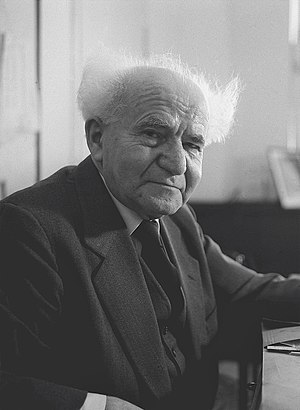
David Ben-Gurion (born David Grün; 16 October 1886 – 1 December 1973) was the primary national founder of the State of Israel and the first Prime Minister of Israel. Adopting the name of Ben-Gurion in 1909, he rose to become the preeminent leader of the Jewish community in British-ruled Mandatory Palestine from 1935 until the establishment of the State of Israel in 1948, which he led until 1963 with a short break in 1954–55.
Selected quote
Selected biography
Cosmo Gordon Lang (1864–1945) was an Anglican prelate who served as Archbishop of York and Archbishop of Canterbury. As Archbishop of Canterbury during the abdication crisis of 1936 he took a strong moral stance, and comments he made in a subsequent broadcast were widely condemned as uncharitable towards the departed king. In his early ministry Lang served in slum parishes in Leeds and Portsmouth before his appointment in 1901 as suffragan Bishop of Stepney in London. In 1908 Lang was nominated Archbishop of York, despite his relatively junior status as a suffragan rather than a diocesan bishop. He entered the House of Lords as a Lord Spiritual and caused consternation in traditionalist circles by speaking and voting against the Lords' proposal to reject David Lloyd George's 1909 "People's Budget". This apparent radicalism was not, however, maintained in later years. At the start of World War I, Lang was heavily criticised for a speech in which he spoke sympathetically of the Kaiser. After the war he supported controversial proposals for the revision of the Book of Common Prayer, but after acceding to Canterbury he took no practical steps to resolve this issue. As Archbishop of Canterbury he presided over the 1930 Lambeth Conference, which gave limited church approval to the use of contraception.
Did you know (auto-generated) -

- ... that a priest refused to perform the wedding ceremony for Austrian socialist Josef Peskoller and his fiancée Maria Griel on political grounds in 1928?
- ... that even though the Legislative Assembly of Quebec ordered a monument of Maurice Duplessis in front of its building, later premiers hid it for 16 years to avoid political tensions?
- ... that the only purpose of the Delaware Straight-Out Truth Teller was to promote a political candidate?
- ... that Kim E. Nielsen trained as a historian of women and politics, and came to disability history and studies via her discovery of Helen Keller's political life?
- ... that the 2009 book Where Heaven and Earth Meet introduced the term "Sacred Esplanade" as a politically neutral term for the religious site in Jerusalem known as al-Haram al-Sharif or the Temple Mount?
- ... that politics in The Simpsons have caused controversy in Argentina, Australia, Brazil, and Japan?
More did you know...
- ...that the first phase of Mitt Romney's 2012 U.S. presidential campaign was announced via a video message?
- ...that Nazi scientists claimed to have trained a dog to call "Adolf Hitler" as "Mein Führer"?
- ...that for many years, the Russian Soviet Republic did not have its Communist Party?
- ...that the World War II idea of Polish-Czechoslovakian confederation was eventually discarded by the Czechs, whose leader chose instead to believe in the Soviet Union promises of alliance?
- ...that although U.S. President Barack Obama is Christian, high-ranked al-Qaida member Ayman al-Zawahiri has falsely claimed that Obama secretly "pray[s] the prayers of the Jews"?
- ...that on the death of Governor George Madison, Kentucky lieutenant governor Gabriel Slaughter was refused the title of "governor" by a hostile state legislature and was referred to as "acting governor" for the duration of his three-year administration?
In this month
- February 4, 2003 – Yugoslavia was renamed to Serbia and Montenegro converting the federal republic to a looser union.
- February 6, 1911 – Ronald Reagan, 40th President of the United States, was born.
- February 16, 2005 – In the United States, the school board in Staunton, Virginia voted to continue classes in Weekday Religious Education. This was a milestone in the issue of Separation of church and state in the United States.
- February 20, 2005 – Spain approves the European Constitution in a consultative referendum, though with a low turnout of 42%.
News and Current events
- August 11: 4 local government areas in New South Wales, Australia locked down after COVID-19 case
- August 11: Australia: AstraZeneca vaccine access expanded by Victorian government
- August 1: Australia: Victorian lockdown lifted
- July 29: Tunisia's president dismisses prime minister, suspends parliament
- July 25: Australia: Wikinews interviews Reg Kidd, mayor of the City of Orange, about COVID-19 lockdown and local government
- July 23: South Australia enters week-long lockdown to contain COVID-19 Delta variant spread
- July 21: Technological University Dublin senior lecturer Dr Lorcan Sirr speaks to Wikinews on housing market in Ireland
- July 21: Three rural councils in New South Wales, Australia enter 7-day lockdown
- July 21: Australia: Victoria lockdown extended by a week with 85 active cases recorded
- July 15: California governor signs new state budget, eligible Californians to get stimulus payments
Topics and categories
General images
Related portals
Associated Wikimedia
The following Wikimedia Foundation sister projects provide more on this subject:
-
Commons
Free media repository -
Wikibooks
Free textbooks and manuals -
Wikidata
Free knowledge base -
Wikinews
Free-content news -
Wikiquote
Collection of quotations -
Wikisource
Free-content library -
Wikiversity
Free learning tools -
Wiktionary
Dictionary and thesaurus


![Image 1 Máire Geoghegan-Quinn, who in 1979 became the first woman in an Irish cabinet since 1921 The Government of Ireland is the cabinet that exercises executive authority in the Republic of Ireland. Its ministers are collectively responsible for the Departments of State administered by the members of the Government. As of 2025[update], twenty-three women have served as cabinet ministers in governments of the Republic of Ireland and its predecessors the Irish Free State (1922–1937) and the Irish Republic (1919–1922). After a 58-year gap between the first and second women ministers, there has been at least one woman in all cabinets since December 1982. No woman has ever been Taoiseach (prime minister), but four women have served as Tánaiste (deputy prime minister). (Full article...)](http://up.wiki.x.io/wikipedia/en/d/d2/Blank.png)





